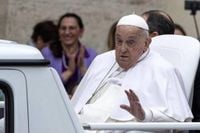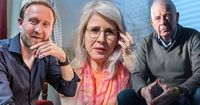On Monday, April 21, 2025, a special episode of 'Nieuws van de Dag' aired, featuring prominent figures Wouter de Winther, Mona Keijzer, Frits Barend, and Raymond Mens. The show delved into significant topics, including the legacy of Pope Francis, the future of the NSC, and the controversial hijacking of the Remembrance of the Dead by pro-Palestinian activists. The program commenced at 18:05 on SBS 6, drawing attention to these pressing issues.
Earlier that day, the news of Pope Francis's death at the age of 88 sent ripples through the media landscape. He 'returned to the house of the Father' at 7:35 AM, a moment that was captured live on NOS.nl. However, television coverage lagged behind; an adjusted programming schedule did not begin until 11:15 AM, when a special extra news bulletin aired. This delay was attributed to the fact that Vatican journalists only received confirmation of his passing around 10:00 AM, necessitating a shift in media focus.
Rob Trip, a prominent journalist, was prepared for the extra NOS news segment, while Vatican expert Stijn Fens joined him in the studio. Their discussion highlighted the multifaceted nature of Pope Francis's legacy. Fens noted that Antoine Bodar once remarked, 'This pope is especially loved by Protestants and heathens.' This sentiment underscores the Pope's unique approach to leadership within the Catholic Church.
Pope Francis was known for his inclusive philosophy, famously advocating for 'todos, todos, todos'—a mantra emphasizing that everyone should feel welcome in the Catholic Church. His actions spoke volumes; on Maundy Thursday, he washed the feet of prisoners, including women and Muslims, showcasing his commitment to compassion and outreach.
In a candid moment, Fens recounted the Pope's stance on homosexuality, recalling his words: 'Who am I to condemn them?' This openness contrasted with the Pope's conservative roots as a South American bishop, who maintained a critical view of contemporary issues such as gender identity and same-sex marriage.
Despite his progressive image, Fens pointed out that Pope Francis did not take a proactive stance on the sexual abuse scandal that has plagued the Church. This aspect of his tenure has drawn criticism from various quarters, highlighting the complexities of his leadership.
Interestingly, the Pope chose not to reside in the papal residence, opting instead for a three-star hotel where he could engage with people during meals. This decision reflected his desire for accessibility and connection with the public, a stark contrast to the isolation often associated with papal life.
The day of the Pope's passing was particularly poignant, arriving just after a significant Easter Sunday that commemorates the resurrection of Jesus. On April 20, 2025, he had been seen laying a hand on the head of a baby, a moment that now resonates with profound emotional significance in light of his death.
As the media continues to reflect on the legacy of Pope Francis, the discussions will undoubtedly evolve. The juxtaposition of his compassionate outreach with his conservative beliefs presents a complex portrait of a leader who sought to bridge divides within the Church and beyond. The upcoming segments of 'Nieuws van de Dag' are expected to explore these themes in greater depth, providing viewers with insights into the future of the Catholic Church in a rapidly changing world.
Meanwhile, the show will also address the future of the NSC, a topic of considerable interest in Dutch politics. As the political landscape shifts, the implications of these changes will be essential for understanding the broader context of governance in the Netherlands.
Additionally, the hijacking of the Remembrance of the Dead by pro-Palestinian activists has sparked significant debate. This controversial act raises questions about the intersection of memorialization and political expression, a topic that will likely be explored in detail during the broadcast.
As the program unfolds, viewers will be encouraged to reflect on the legacy of Pope Francis, the evolving political landscape, and the implications of activism within the context of remembrance. The discussions promise to be both engaging and thought-provoking, inviting audiences to consider the complexities of faith, politics, and social justice.






